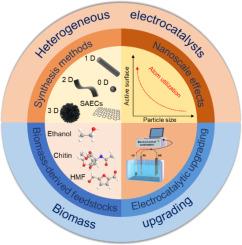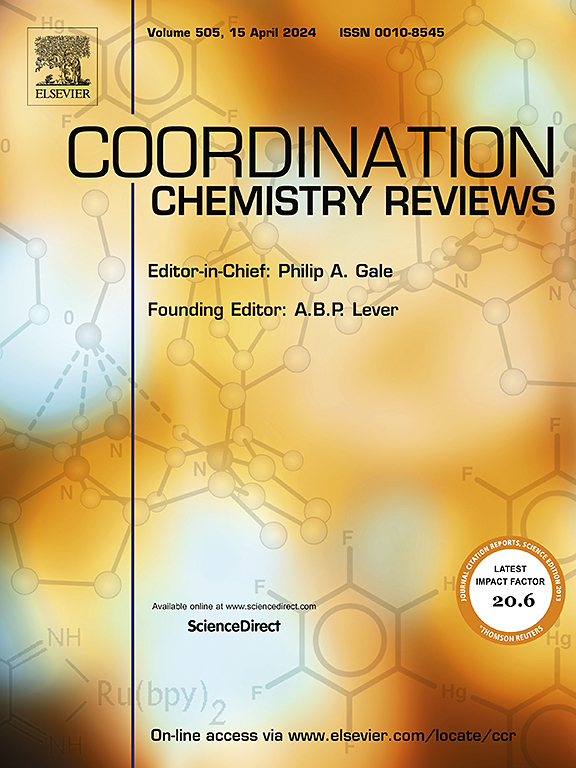Heterogeneous electrocatalysts from nanostructures to single atoms for biomass-derived feedstocks upgrading
IF 20.3
1区 化学
Q1 CHEMISTRY, INORGANIC & NUCLEAR
引用次数: 0
Abstract
Sustainable energy-driven electrochemical upgrading of the globally available and already-fixed biomass-derived feedstocks enables the decentralized low-temperature synthesis of upgraded chemicals and fuels, providing a promising pathway to alleviate the global warming and environmental deterioration caused by excessive consumption of fossil fuels. Leveraging these achievements necessitates highly active, selective, stable and cost-effective heterogeneous electrocatalysts, which can be obtained by size and morphology engineering at nanoscale. Herein, we summarize the recent progress on size and morphology-controlled synthesis of various nanostructured electrocatalysts with dimensions ranging from 3D, 2D, 1D, and 0D, and single-atom electrocatalysts after brief introduction of nanoscale size/geometry effects, and biomass-derived feedstocks. Subsequently, the electrocatalytic applications of these well-developed nanomaterials for biomass-derived feedstocks upgrading through electrochemical oxidation and reduction are given, with specific emphasis on exploring the underlying structure-performance correlations by combined experiments, in situ/operando spectroscopy characterizations and theory simulations. Finally, a brief conclusion and remarks on future challenges and opportunities regarding further development of advanced heterogeneous electrocatalysts for biomass valorization are presented.


用于生物质原料升级的从纳米结构到单原子的异质电催化剂
可持续能源驱动的电化学升级全球可用的和已经固定的生物质来源的原料,使去中心化的低温合成升级的化学品和燃料,提供了一个有希望的途径,以缓解全球变暖和过度消耗化石燃料造成的环境恶化。利用这些成果需要高活性、选择性、稳定性和成本效益高的非均相电催化剂,这些催化剂可以在纳米尺度上通过尺寸和形态工程获得。在此,我们简要介绍了纳米尺寸/几何效应和生物质原料后,总结了尺寸和形貌控制合成各种尺寸从3D、2D、1D和0D的纳米结构电催化剂和单原子电催化剂的最新进展。随后,给出了这些发展良好的纳米材料通过电化学氧化和还原在生物质原料升级中的电催化应用,特别强调了通过组合实验、原位/操作光谱表征和理论模拟来探索潜在的结构-性能相关性。最后,对生物质增值用先进多相电催化剂的进一步发展提出了挑战和机遇。
本文章由计算机程序翻译,如有差异,请以英文原文为准。
求助全文
约1分钟内获得全文
求助全文
来源期刊

Coordination Chemistry Reviews
化学-无机化学与核化学
CiteScore
34.30
自引率
5.30%
发文量
457
审稿时长
54 days
期刊介绍:
Coordination Chemistry Reviews offers rapid publication of review articles on current and significant topics in coordination chemistry, encompassing organometallic, supramolecular, theoretical, and bioinorganic chemistry. It also covers catalysis, materials chemistry, and metal-organic frameworks from a coordination chemistry perspective. Reviews summarize recent developments or discuss specific techniques, welcoming contributions from both established and emerging researchers.
The journal releases special issues on timely subjects, including those featuring contributions from specific regions or conferences. Occasional full-length book articles are also featured. Additionally, special volumes cover annual reviews of main group chemistry, transition metal group chemistry, and organometallic chemistry. These comprehensive reviews are vital resources for those engaged in coordination chemistry, further establishing Coordination Chemistry Reviews as a hub for insightful surveys in inorganic and physical inorganic chemistry.
 求助内容:
求助内容: 应助结果提醒方式:
应助结果提醒方式:


